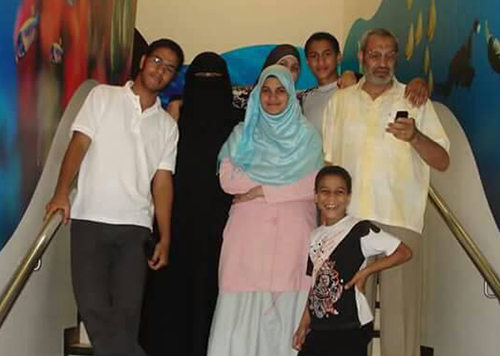Every two weeks Mohamed al-Fakharany prepares to visit his brother, Abdullah al-Fakharany, in prison. He packs food, clothes, books, and, most importantly, written responses to his older brother’s letters. Mohamed al-Fakharany, who told CPJ that he has never missed a visit, was only 11 when his brother– the executive director of opposition news outlet Rassd–was arrested in 2013 and later sentenced to 25 years in prison on anti-state charges.
Mohamed al-Fakharany said that in their letters, the brothers discuss whatever they didn’t have time to talk about during the short visits at Cairo’s Tora prison. He said that his older brother gives him general advice and recommendations for his reading list, and Mohamed al-Fakharany gives updates about his German lessons.
“The letters help, but nothing is ever enough. I still miss him,” Mohamed al-Fakharany, 15, said.
Mohamed al-Fakharany said he has hope that the family may be reunited this month. On May 8, a verdict is expected in the retrial of Abdullah al-Fakharany and five other journalists: Samhi Mustafa, co-founder of Rassd; Mohamed al-Adly of Amgad TV; Hany Salah el-Deen, news manager of Misr 25, a channel supportive of the Muslim Brotherhood, and Mosad Al-Barbary, the channel’s administrative manager; and Hassan el-Kabbani, who freelanced for several outlets including Rassd. The journalists were all convicted in 2015 of “spreading chaos” and “forming an operations room to direct the Muslim Brotherhood to defy the government” in what is known in Egypt as the Raba’a Operations Room case. The name refers to the sit-in at Raba’a Al-Adawiya in Cairo, when Egyptians gathered to protest the ouster of President Mohamed Morsi. The dispersal on August 14, 2013, left hundreds dead, according to news reports.
Al-Fakharany and the others are among the 25 journalists jailed for their work in Egypt at the time of CPJ’s last prison census. The trials of three other journalists included on the census are also scheduled to take place in May.
They include:
- Abdullah Shousha
Shousha, a correspondent of Amgad TV and contributor to Rassd, is due in court May 2, along with 88 other defendants, according to his sister, Rahma Shousha, and local rights group Journalists Against Torture. Shousha was arrested September 22, 2013 while covering a protest in Ismailiya, according to CPJ research. The journalist and his co-accused are charged with belonging to the banned Muslim Brotherhood, belonging to an armed group, and setting fire to vehicles belonging to members of the judiciary and the police. Shousha, who is pursuing a bachelor’s degree in sociology from prison with the Suez Canal University, has an examination scheduled on the same day as the court hearing, his sister told CPJ.
- Mahmoud Abou Zeid
Freelance photojournalist and IPFA awardee Mahmoud Abou Zeid, known as Shawkan, is scheduled to appear before a Cairo criminal court on May 9, his brother Mohamed Abou Zeid told CPJ. Shawkan was arrested August 14, 2013 while covering the dispersal of the sit in at Raba’a al-Adawiya in Cairo for the UK-based website, Demotix. He and his 738 co-accused are facing charges of possessing weapons, illegal assembly, attempted murder, and murder, according to CPJ’s research. Shawkan has been held in pre-trial detention for more than three and a half years, and his court hearings are often delayed or canceled.
- Mahmoud Abdel Nabi
The trial in Alexandria of Rassd journalist Abdel Nabi– the longest-held journalist in Egypt on CPJ’s latest census–will continue May 21, Abdelrahman Yaqot, a journalist who was present at his last court hearing, told CPJ. Abdel Nabi was arrested July 3, 2013 while covering clashes between pro-Muslim Brotherhood protesters and security forces in Alexandria, hours after the ouster of Mohamed Morsi, according to CPJ’s research. Abdel Nabi, whose trial only started in 2016, is charged with of rioting and possessing weapons.
Since the ouster of Morsi and the rise of President Abdel Fattah el-Sisi to power, Egypt has moved from a country with no journalists behind bars in CPJ’s 2012 prison census, to being one of the leading jailers in the world, according to CPJ’s research. Sisi’s crackdown on the press includes authorities using anti-state charges and accusations of being connected to the banned Muslim Brotherhood to jail journalists, and implementing restrictive press laws and regulations.
